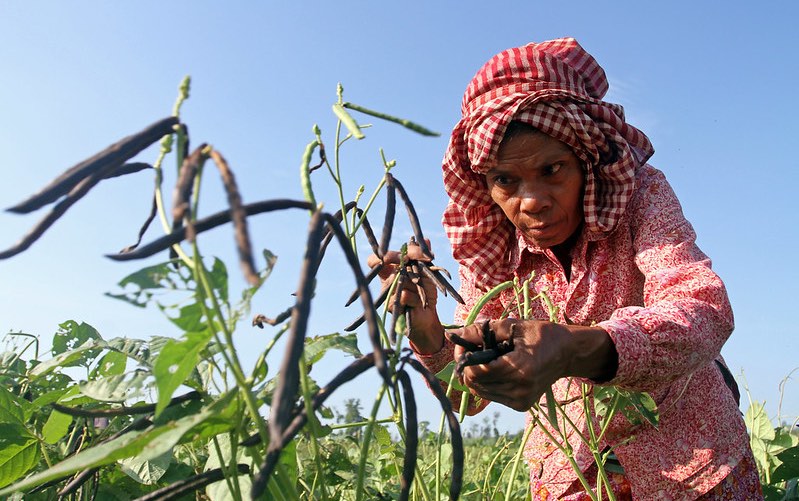Addressing gender inequality is essential to achieving sustainability in agriculture. High levels of inequality make it harder to increase productivity and reduce poverty and hunger. Countries where incomes are highly unequal have, on average, lower levels of land productivity and are more prone to food insecurity. These inequities are slowing many countries’ progress toward Sustainable Development Goal 2 (SDG2) to “end hunger, achieve food security and improved nutrition and promote sustainable agriculture” by 2030.
Gender inequality undermines progress toward sustainable agricultural development across multiple dimensions.
Women and girls make almost half of the agricultural workforce in developing countries, and that workforce is typically large. For example, over 60% of all employed women in Africa south of the Sahara work in agriculture. Yet women in agriculture face a variety of obstacles and constraints that their male counterparts do not—including lack of access to training, machinery, and new technology. In highly unequal countries, the majority of the farming population, particularly women, lacks the economic resources and capacity to invest in appropriate agricultural technologies, as well as the knowledge to implement improved agricultural practices. Because of the disparity in access, women farmers face an increasing knowledge gap.
Women also have difficulty in access to land ownership, extension services, and finance. Agricultural credit, for instance, is critical for farmers to manage the seasonality of agricultural income and expenditures, and to invest in technologies and long-term farm improvements.
An extensive literature review confirms the link between increasing women’s land rights and poverty reduction. Land rights can also been seen as a key factor in rural households that seek out economic migration. A recent report from FAO analyzed the synergies of land rights in Niger and how it affected the majority rural population vis a vis food security and sustainable agriculture development.
FAO
What are the possible solutions? Various tools are available to help reduce inequalities between income groups and between genders. One is strengthening land tenure rights among poor rural farmers. This element is critical to addressing the first layer of inequality. If a woman cannot own land, she cannot be in charge of her own livelihood or destiny.
Another approach is to develop innovative strategies to improve access to credit and agricultural services for marginalized farm populations. This requires strategic investment in public goods and programs that benefit marginalized populations. These include rural infrastructure, education and health services and programs such as credit, subsidized inputs, information and extension.
Monitoring progress and empowerment through tools such as IFPRI’s project-level Women’s Empowerment in Agricultural Index (pro-WEAI) allows countries to document and adjust policy on the various facets of livelihood activities, the sale or use of outputs, the use of income, and borrowing from financial services.
Ensuring the benefits of such investments reach the groups that need them will require tailored services and targeted delivery, including gender sensitive and pro-poor targeting. This will in turn support better, more sustainable agriculture—and in the end, a better landscape for all.
Adriana Ignaciuk is a Senior Economist at the UN Food and Agriculture Organization (FAO) and Economic and Policy Analysis of Climate Change (EPIC) Team Leader. Nilar Andrea Chit Tun is a Knowledge Management Specialist for EPIC and a former IFPRI Senior Communications Specialist.







